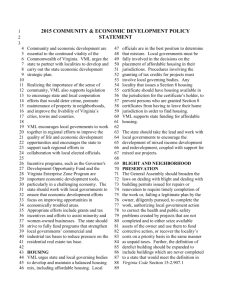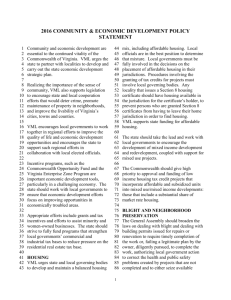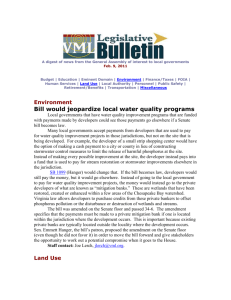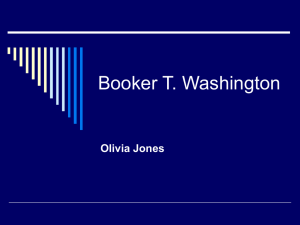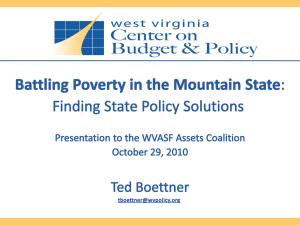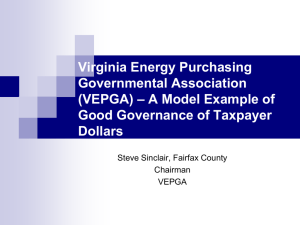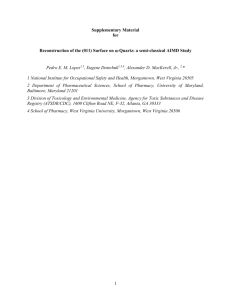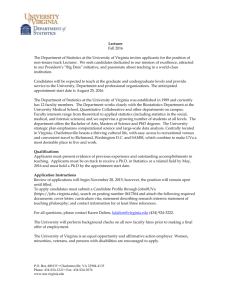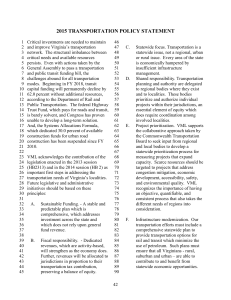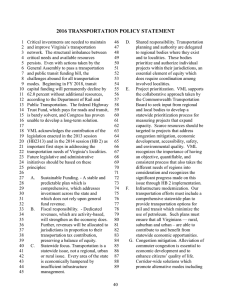Jan 14, 2011 edition
advertisement
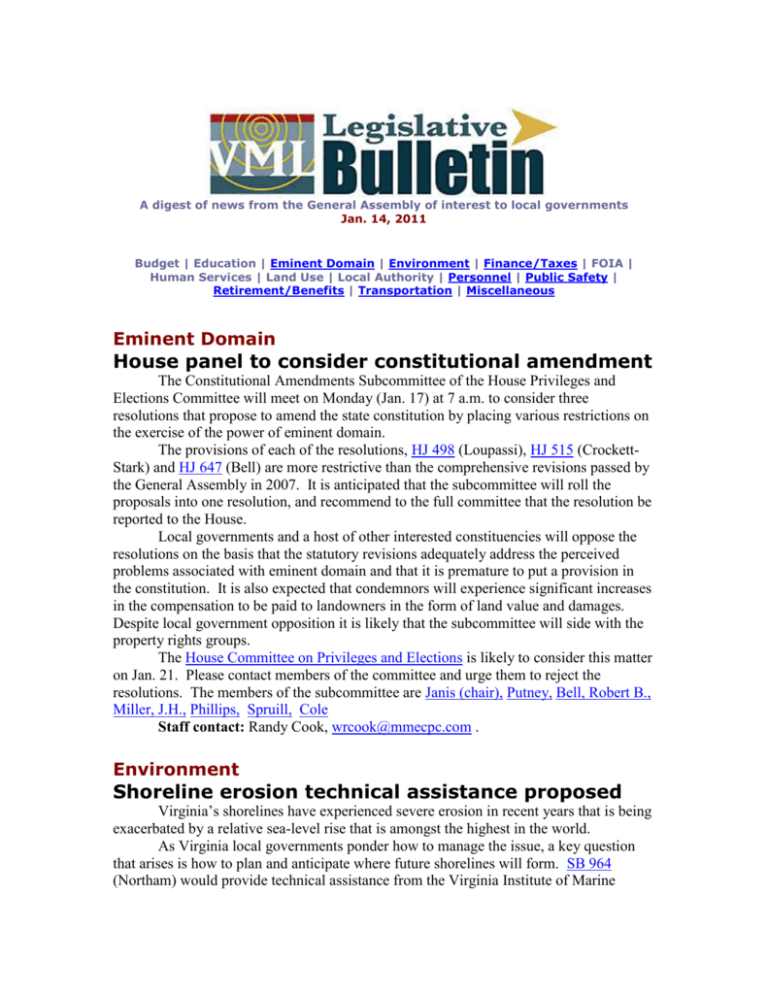
A digest of news from the General Assembly of interest to local governments Jan. 14, 2011 Budget | Education | Eminent Domain | Environment | Finance/Taxes | FOIA | Human Services | Land Use | Local Authority | Personnel | Public Safety | Retirement/Benefits | Transportation | Miscellaneous Eminent Domain House panel to consider constitutional amendment The Constitutional Amendments Subcommittee of the House Privileges and Elections Committee will meet on Monday (Jan. 17) at 7 a.m. to consider three resolutions that propose to amend the state constitution by placing various restrictions on the exercise of the power of eminent domain. The provisions of each of the resolutions, HJ 498 (Loupassi), HJ 515 (CrockettStark) and HJ 647 (Bell) are more restrictive than the comprehensive revisions passed by the General Assembly in 2007. It is anticipated that the subcommittee will roll the proposals into one resolution, and recommend to the full committee that the resolution be reported to the House. Local governments and a host of other interested constituencies will oppose the resolutions on the basis that the statutory revisions adequately address the perceived problems associated with eminent domain and that it is premature to put a provision in the constitution. It is also expected that condemnors will experience significant increases in the compensation to be paid to landowners in the form of land value and damages. Despite local government opposition it is likely that the subcommittee will side with the property rights groups. The House Committee on Privileges and Elections is likely to consider this matter on Jan. 21. Please contact members of the committee and urge them to reject the resolutions. The members of the subcommittee are Janis (chair), Putney, Bell, Robert B., Miller, J.H., Phillips, Spruill, Cole Staff contact: Randy Cook, wrcook@mmecpc.com . Environment Shoreline erosion technical assistance proposed Virginia’s shorelines have experienced severe erosion in recent years that is being exacerbated by a relative sea-level rise that is amongst the highest in the world. As Virginia local governments ponder how to manage the issue, a key question that arises is how to plan and anticipate where future shorelines will form. SB 964 (Northam) would provide technical assistance from the Virginia Institute of Marine Science (VIMS) to guide Virginia’s tidal localities on “preferred options for shoreline management” that takes into consideration existing conditions and projected sea-level rise. For the purposes of the bill, tidal localities are those identified in the Chesapeake Bay Local Assistance Act of 1988. Beginning in 2013 those local governments would then incorporate the guidance into their comprehensive plans. The bill also directs VIMS, the Department of Conservation and Recreation, and the Virginia Marine Resources Commission to develop permit guidance for shoreline development that promotes the use of “living shorelines.” Living shorelines is a management practice that addresses erosion in lower energy situations by providing long-term protection, restoration or enhancement of vegetated shoreline habitats through strategic placement of plants, stone, sand fill and other structural or organic materials. The bill will be considered Monday morning in Senate Agriculture, Chesapeake and Natural Resources Committee. Staff contact: Joe Lerch, jlerch@vml.org. Finances/Taxes Machinery and tools tax faces new assault Del. Bob Purkey, chairman of the House Finance Committee, has introduced yet again another measure to end local taxation of machinery and tools. His bill from last session was defeated twice on the House floor after heavy lobbying from localities. In this year’s version -- HB 1636 -- machinery and tools purchased on or after July 1 would be subject solely to state taxation as intangible personal property for the first three years after the date of purchase or after being brought into Virginia for the first time. For years four through 10, machinery and tools would be considered personal property and subject to local taxes. However, after the tenth year of service, this same property reverts to intangible personal property and is no longer subject to local taxes, if the assessed value of the machinery and tools exceeds 1 percent of the original cost. It is interesting to note how the same piece of equipment transforms repeatedly from a tangible to an intangible status. However, under state statute (§ 58.1-1100), only the state can tax intangible personal property. As a matter of policy, the state has chosen not to do so. The bill has been referred to the House Finance Committee. Staff contact: Neal Menkes, nmenkes@vml.org Other bills … Send out the bill collectors Summary: HB 1425 (Albo) reduces the period of nonpayment of taxes, from six months to three months, before sheriffs may be used to collect delinquent local taxes. The bill also removes the exclusion of real estate taxes from the local taxes that treasurers may refer to private collection agents for collection. Action: Referred to the House Finance Committee. Recordation tax reduction on deeds of trust Summary: HB 1431 (Albo) reduces the state recordation tax on deeds of trust from $0.25 per $100 of the amount financed to $0.2375 per $100 of such amount. The bill also eliminates the reduced recordation tax based on deeds of trust securing a refinanced mortgage with the same lender. Under current law, the recordation tax on deeds of trust for such refinancing applies only to the extent that the amount of the refinancing exceeds the original amount of financing. The bill is important to local governments because the state code caps the rates that localities can impose for recordation to one-third of the state recordation tax. In other words, if the state rate goes down, so does the maximum rate that cities and counties can charge. Action: Referred to the House Finance Committee. Reduced recordation tax extension, modification Summary: SB 780 (Reynolds) expands for a three-year period to expire on June 30, 2014, the reduced recordation tax now imposed to deeds of trust securing a refinanced mortgage with the same lender to all such refinancings, regardless of lender. The bill is part of the Virginia Association of Realtors’ legislative package. Action: Referred to the Senate Finance Committee. Imposition of BPOL Summary: HB 1437 (Cole) allows localities to decide whether to impose the BPOL tax on a business's gross receipts or its Virginia taxable income. Delegate Cole unsuccessfully introduced an identical bill last session. Last year’s fiscal impact statement from the Department of Taxation said the bill would have an unknown revenue impact. A similar measure, HB 1587, has been introduced by Del. Sal Iaquinto, but that measure permits the City of Virginia Beach and the City of Chesapeake to exempt from license taxes any business locating in either city for the first time, for the first two years after such location. Action: Both bills have been referred to the House Finance Committee. BPOL limitations, restrictions Summary: SB 753 (Saslaw) adds additional time limitations by which the tax commissioner must rule on BPOL administrative appeals and requests for advisory written opinions. The bill also would limit the tax commissioner to reviewing matters of law and would prohibit him from considering any additional or revised facts when ruling on any request for reconsideration of a BPOL determination previously issued by him. Action: Referred to the Senate Finance Committee. Personnel Right to work constitutional amendment advances A constitutional amendment -- HJR 500 (Richard Bell) -- inserting the state’s right to work law into the constitution was reported to the floor on a 10-6 vote at this morning’s meeting of the House Privileges & Elections Committee. Staff contact: Mary Jo Fields, mfields@vml.org . Public Safety Other bills … Civil immunity regarding guns Summary: HB 2380 (Pogge) will provide civil immunity for employers who do not prohibit their employees from storing a firearm in their vehicles while parked on the employer's property from damage resulting from the storage of that firearm. Action: Not yet referred to a committee. Retirement / Benefits VRS budget amendments clarified Local employees hired after July 1 would be required to pay 5 percent member contribution The staffs of the House Appropriations and Senate Finance committees have clarified the intention of confusing language in Gov. Bob McDonnell’s budget amendments regarding proposed changes in funding VRS. The budget amendment would require local employees hired on or after July 1, 2011, to pay the 5 percent employee VRS retirement contribution. As previously reported, the amendment would permit local employers to require employees hired prior to July 1, 2010 (Plan 1 employees) to pay this employee contribution if they also provide a salary increase of at least 3 percent. The state budget in its current form allows local employers who had elected to pay the 5 percent member contribution to require employees hired after July 1, 2010 (Plan 2 employees) to pay some or all of the required 5 percent member contribution. Employers had to continue paying the 5 percent member contribution for Plan 1 employees, however, if they had elected to do that in the past. The budget amendment does not address local employees entering the system between July 1, 2010 and July 1, 2011. However, staff members of the House Appropriations and Senate Finance committees have opined that local employers that decide to begin requiring Plan 1 employees to pay the member contribution would have to also require employees hired between July 1, 2010 and July 1, 2011 to pay the 5 percent member contribution, even if a salary increase was not given. Staff contact: Mary Jo Fields, mfields@vml.org Joannou presses shifting VRS costs to localities House Appropriations Committee member Del. Johnny Joannou of Portsmouth appeared to be looking for a way to shift even more funding of the teacher retirement system to local governments at a subcommittee meeting Thursday. Joannou pressed VRS Executive Director Bob Schultze to separate out the amount of the unfunded liability of the teacher retirement system that could be attributed to localities from that which could be attributed to the state. Schultze replied that VRS could develop approximate numbers for the committee. In past years Joannou has repeatedly asked questions that appear to put the blame on localities for the cost of retirement, because of salary increases given at the local level that exceed those funded by the state. The teacher retirement system is currently 69 percent funded, meaning that the plan has enough assets to pay 69 percent of its claims, should they suddenly all come due. VRS continues to profit from the growth in the stock market, posting a 13.6 percent investment return in the first six months of FY11. The fund stands at about $53.3 billion. The fund’s worth was $47.7 billion at the end of FY10. In reviewing the funded status of the judges retirement plan, Del. Chris Jones asked if any consideration had been given to employees paying the cost of enhanced retirement benefits. Schultze replied that evidently no one was willing to go down that road. Judges receive 2 ½ years of service for each year of employment. They are not, however, the only group receiving enhanced retirement benefits. Public safety officers receive enhanced benefits as well. Staff contact: Mary Jo Fields, mfields@vml.org . Transportation New transportation funding proposals would keep sales tax revenue in Northern Va., Hampton Roads Governor spells out additional proposals at press conference Gov. Bob McDonnell announced a number of additional legislative proposals for transportation at a press conference in Richmond this morning. Among them was a new funding proposal aimed at redirecting a portion of the sales tax collected in Northern Virginia and Hampton Roads toward alleviating the chronic road congestion in the two populous regions. Legislation to be introduced would dedicate a portion of the sales tax not already dedicated to local governments, education or transportation and generated within the designated metropolitan planning areas (MPOs) toward transportation improvements in these regions. If adopted the measure would take effect in FY13, resulting in a $150 million annual decrease of general fund revenues for public education, higher education, public safety, economic development, and environmental quality. In remarks this morning the governor said that his proposal would generate roughly $100 million in Northern Virginia and $50 million in Hampton Roads annually to be used at the discretion of the respective MPOs. In an effort to relieve congested traffic on I-64 in Hampton Roads, the governor also proposes to grant a $50 per container income tax credit for any company that ships cargo containers via barge or rail. In an effort to reduce commuter congestion throughout the state, the governor also proposes to provide tax credits to employers for expenses incurred in allowing employees to telework. An employer would be eligible for a credit of up to $1,200 per teleworking employee with the total credit amount any one employer may take for taxable years 2012 and 2013 limited to $50,000. The aggregate amount of tax credits that will be issued would be capped at $1 million annually for taxable years 2012 and 2013. Additional proposals of the governor’s legislative package announced today include the following: A constitutional amendment to prohibit the governor and General Assembly from transferring money from the Commonwealth Transportation Fund to the General Fund; Authorization to enable allocations from the Rail Enhancement Fund to be used as matching funds for federal grants to support rail projects; The transfer the administration of the motor vehicle rental tax from DMV to the Department of Taxation; and Consolidation of the Northern Virginia Transportation Authority, the Northern Virginia Transportation Commission and the Potomac and Rappahannock Transportation Commission into one organization (this proposal includes additional funding to the newly consolidated Northern Virginia Transportation Authority). For a complete list of the governor’s transportation proposals, including a link to 900 road and transit projects the administration proposes to begin construction on within the next three years, either click here or paste this address into your web browser: http://bit.ly/ecRza7 . Staff contacts: Joe Lerch, jlerch@vml.org; Neal Menkes, nmenkes@vml.org. Miscellaneous Aug. 23 primary date proposed Primaries for state and local offices would be scheduled on Aug. 23 under a substitute version of HB 1507 (Cole). The substitute was reported to the floor this morning by the House Privileges & Elections Committee. Legislation -- SB 947 (Howell) – also is pending in the Senate. These bills both have emergency clauses and would take effect upon passage. Without these bills, primaries would have to be held June 14, which does not allow enough time for the redistricting process. Staff contact: Mary Jo Fields, mfields@vml.org . Governor spells out priorities in address Gov. Bob McDonnell laid out his legislative priorities to the General Assembly during the State of the Commonwealth address on Wednesday night. After listing a number of accomplishments of his one-year-old administration, the governor cited a handful of problems that he believes must be addressed. They included steep increases in college tuition, traffic congestion in Northern Virginia and Hampton Roads, and the continuing rise in Medicaid spending. In line with these concerns, the governor said that his top four priorities are: formulating new job-creating tools and resources to help boost job growth; implementing major reforms and adding more accountability in higher education to make college more affordable and accessible; spending more money on transportation, especially highways, but without increasing taxes; and reforming and streamlining state government, including getting the state out of the retail side of selling liquor. Addressing the problems, however, will require new spending at a time when the state is still trying to recover from the effects of the recession. For example, McDonnell wants to spend an additional $54 million on economic development to create jobs and attract businesses to the state, $50 million as a down payment to ratchet-up funding for colleges, and $4 billion – including $3 billion in debt – for transportation. Near the opening of the speech, the governor paused for a moment of silence for the victims of the mass shooting in Tucson, Ariz. Referencing that violence, McDonnell discussed the resilience of America and spoke of the need to “embrace an atmosphere of civility and mutual respect.” That call didn’t stop the governor from taking some mild partisan swipes at Washington over decisions to eliminate the Hampton Roads-based U.S. Joint Forces Command, impose restrictions on offshore drilling, and the fiscal impact on states of the new federal health care law. The full text of the governor’s speech can be found here: http://bit.ly/hm8VPJ . Legislative Bulletin delivery tweaked This year’s Legislative Bulletin has been changed a bit. Because VML is using a third-party vendor to distribute it, subscribers should recently have received an automated request via e-mail asking them to confirm their subscription. There is always a chance that some of the e-mails, which were sent as a batch, were trapped in spam filters or deposited in junk e-mail folders. If you know of someone on your staff who should be getting the Legislative Bulletin, but who did not receive this edition via e-mail, they can sign-up to receive it at: http://forms.aweber.com/form/45/1476587245.htm . It is important that people who did not receive the confirmation e-mail, but who wish to receive the Legislative Bulletin, do so by going to this link. If someone on your staff is having trouble signing-up, contact David Parsons at dparsons@vml.org or 804-523-8527.
